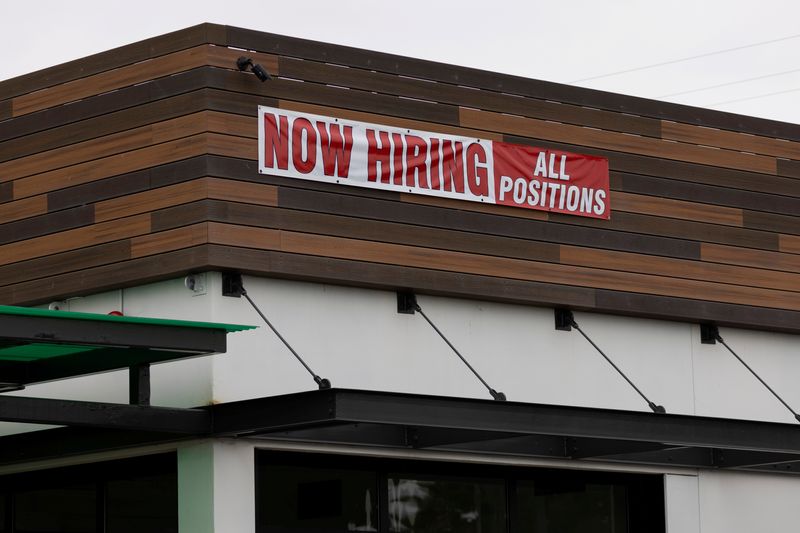By Timothy Aeppel and Ann Saphir
(Reuters) – Jay Baker is not worried about a recession. He worries about whether his new workers will keep leaving before the end of their first shift.
The chief executive of Jamestown Plastics Inc, which operates a 100-worker plastics factory in western New York state, said before the pandemic he could usually get all the extra hands he needed through a local temp agency.
“Now,” he said, “when we ask for 15, they’ll send us five, and two will leave before lunch on the first day.”
For all the recent public fretting about a potential recession, Baker’s experience is emblematic of what one top U.S. central banker on Friday called an “incredibly tight” labor market and suggests that, in much of the real economy, the economic slowdown Fed policymakers are trying to engineer has yet to bite.
Private companies added far more workers than expected in June, the Labor Department’s closely watched monthly report showed on Friday, pushing non-government-sector employment above its pre-pandemic level to a record.
Though the leisure and hospitality sector remains 1.3 million jobs below its February 2020 level, jobs elsewhere have surged well above, including transportation and warehousing, which now has three-quarters of a million new positions more than it did pre-pandemic. In manufacturing, where Baker works, employment has also moved above its pre-pandemic level, the report shows.
Wages, overall, continue to rise, and there is no indication that companies are cutting hours either. Friday’s report showed the number of people working part-time for economic reasons, a category that swells during recessions, hit a 21-year low in June.
Indeed, of 15 labor market indicators tracked by the Atlanta Fed, eight are at or near their best-ever levels, and only three remain below where they were in February 2020.
“When I go to cities and towns, I see cranes everywhere,” U.S. Labor Secretary Marty Walsh told Reuters in an interview. “Businesses investing. Those are not signs of recession.”
Walsh’s boss – President Joe Biden – was also quick to push back on recession talk.
“Our private sector has now recovered all of the jobs lost during the pandemic and added jobs on top of that,” Biden said at the White House on Friday. “We have more Americans working today in the private sector than any day under my predecessor, more today than any time in American history.”
And yet, recession fears have grown in recent weeks as other economic data, including consumer spending and surveys of manufacturing activity, point to a slowdown, though how sharp a one is the big unknown.
Inflation at 40-year highs is also doing little to staunch consumer fears of a downturn. Perhaps ironically, Friday’s jobs report means the Fed will keep turning the screws on interest rate hikes to contain inflation, something that will likely keep the recession talk alive.
Back in western New York, meanwhile, Baker is still trying to come to grips with the evolving nature of the job market spawned by the pandemic and the new attitudes toward work it appears to have fostered.
One new worker walked out of Baker’s plant in the middle of his shift just this past Monday.
“We asked him, ‘Why?,’ and he said, ‘This job just isn’t me,'” said Baker, who acknowledged that many of his jobs can be a bit tedious. But the factory is air conditioned and he pays well above minimum wage, close to $15 an hour. “I just don’t get why someone walks out the door,” he said. “I mean, you work for a temp agency – why wouldn’t you at least stay at this job while you figure out what you really want to do?”
(Reporting by Timothy Aeppel, Ann Saphir and Howard Schneider; Editing by Dan Burns and Jonathan Oatis)
